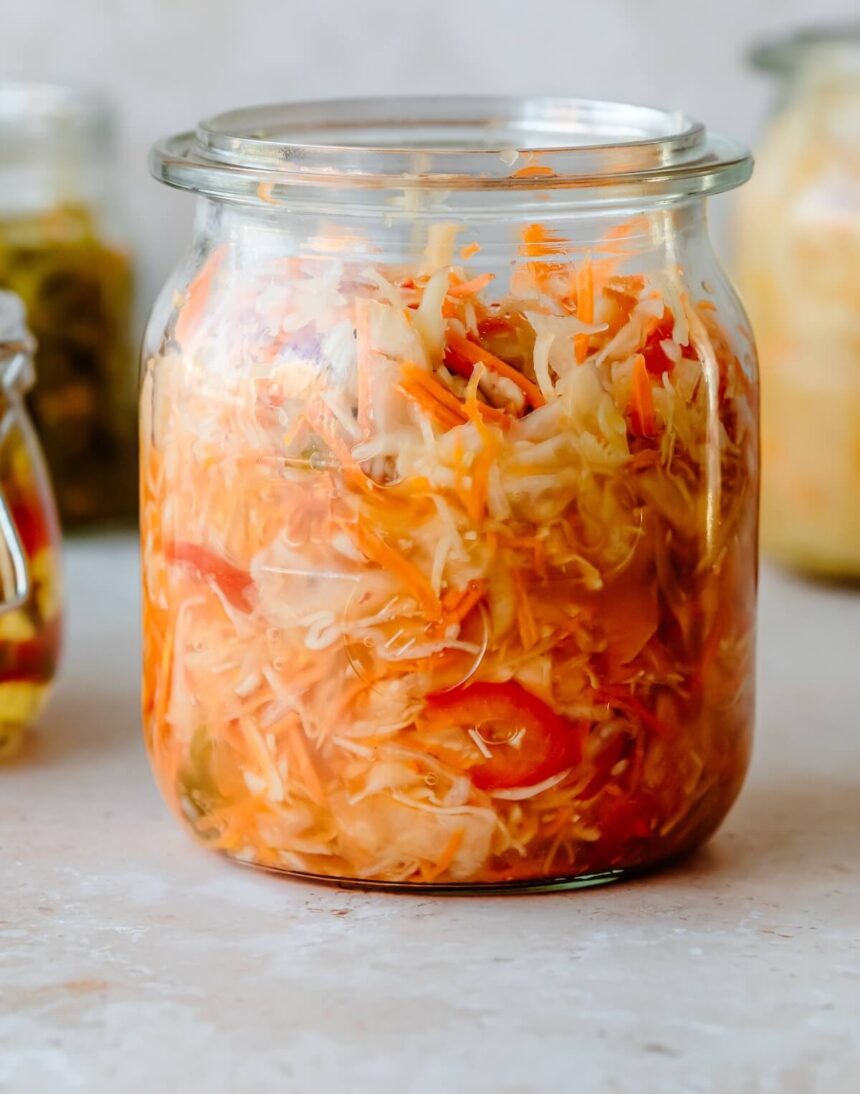Kombucha, kimchi, and sauerkraut seem to be taking over grocery stores and Instagram feeds, with thousands of wellness influencers raving about fermented foods.
What’s the magic of fermented products all about, and are they really as healthy as they sound? And even more, which fermented products should you choose for your gut health? Here’s what nutrition experts are saying about fermented foods.
What Are Fermented Foods and How Do They Work?
The basics of fermented foods are quite straightforward. Jonathan Valdez, Registered Dietitian Nutritionist and the owner of Genki Nutrition, explains the mechanics of fermented foods simply: “Bacteria or yeast consume sugars from foods and then produce acids or alcohols as a by-product, which is then used to preserve foods.”
There are two main ways to ferment foods: one is naturally using microorganisms present in the raw food or processing environment (like sauerkraut), and the other is by adding starter cultures (like kefir or kombucha).
This fermentation process, however, promotes the growth of good bacteria in our gut.
“Fermentation not only preserves the food but also enhances its flavor and nutrient content. The beneficial microorganisms present in fermented foods produce enzymes that help our bodies absorb nutrients more efficiently,” explains Dr. Sharmela Devi G., Dietitian- Nutritionist at MACS Clinic.
Health Benefits of Fermented Foods
Fermented foods have been used for better health for centuries, but only now are we learning about the benefits fermented products have on our health (and those benefits are vast). This 2023 overview even called fermented vegetables ‘therapeutic’ and highlighted how fermented vegetables may help treat IBS.
“When fermented foods are added to our diet, they are useful in increasing the number of good bacteria in our digestive system, creating more diverse microbiota for our gut health,” mentioned Emily Norman, RD, a registered dietitian and contributor at Health Insiders.
Here are some of the other key health benefits of fermented foods:
Improved Digestion
The probiotics present in fermented foods support the growth of healthy bacteria in our gut, which plays a crucial role in digestion.
Consuming fermented foods can help alleviate digestive issues such as bloating, constipation, and diarrhea.
“Sauerkraut has major gastrointestinal benefits as it provides a large amount of live microorganisms to the gut microbiota. Not only does this help immune system development, but it also provides the gut with the Lactobacillus bacteria leveraging the gut’s probiotic activity, helping those with conditions such as inflammatory bowel syndrome (IBS),” commented Dan Jackowiak, Nc, HHP, the Founder of Yeast Infection Advisor.
Boosted Immune System
Our immune system is heavily influenced by the health of our gut. The beneficial microorganisms found in fermented foods help to strengthen our immune system by promoting the growth of beneficial bacteria and crowding out harmful bacteria.
One 2022 research mentioned how the bioactive compounds in fermented foods improve the body’s immune response due to boosting certain mechanisms in the body, including T-lymphocytes.
It has also been found that fermented foods may decrease inflammation in the body, which, in turn, improves the body’s immune response.
Enhanced Nutrient Absorption
Fermented foods contain a higher concentration of vitamins, minerals, and antioxidants compared to their unfermented counterparts.
The enzymes produced during fermentation make these nutrients more bioavailable, ensuring our bodies can absorb them easily.
Improved Mental Health
Research has shown a strong connection between our gut health and mental health. The probiotics in fermented foods have been found to reduce symptoms of anxiety, depression, and stress.
Though there’s still more research needed, several studies have shown a connection between lower stress levels and high consumption of fermented products.
Examples of Fermented Foods to Include in Your Diet
Now that we understand the benefits of fermented foods let’s take a look at some examples that you can easily incorporate into your diet. Here’s a list of fermented foods you may want to add to your daily diet:
- Yogurt: This is perhaps the most commonly known fermented food. It contains probiotics that promote gut health and improve digestion. When choosing yogurt, opt for natural Greek yogurt as it’s also high in protein and doesn’t contain added sugar.
- Kefir: This fermented milk drink is rich in probiotics, calcium, and vitamin D. It has been found to boost our immune system and improve bone health. Emily Norman, RD, recommends using kefir in smoothies for an added nutrition boost. “I use kefir as the liquid component for my smoothies to add in more probiotics instead of, for example, almond milk, which brings little nutritionally to the table,” she explains.
- Kimchi: A staple in Korean cuisine, kimchi is made by fermenting cabbage and other vegetables. It is rich in vitamins, minerals, and antioxidants.
- Sauerkraut: This fermented cabbage dish is a good source of probiotics and vitamin C. It also contains compounds that may have anti-cancer properties. “When shopping for pickles or sauerkraut, be sure to check the refrigerated aisle (not the pantry aisle) and choose products labeled “naturally fermented,”” pointed Norman.
- Kombucha: Made from fermented black tea, this beverage is known for its high probiotic content and antioxidant properties. Make sure to check the sugar content in the kombucha, though, since some kombucha products may be too rich in added sugars.
- Tempeh: This fermented soybean product is a good source of protein, probiotics, and nutrients such as vitamin B12 and iron. Tofu and miso are also great fermented products to consider, especially since soybeans are considered one of the highest-protein beans out there.
Dr. Sharmela Devi G recommends adding different fermented products to your daily diet slowly but consistently. “Including a variety of these fermented foods in your diet can have numerous benefits for your overall health. Start by incorporating one or two servings per day and gradually increase the consumption over time,” she recommends.








